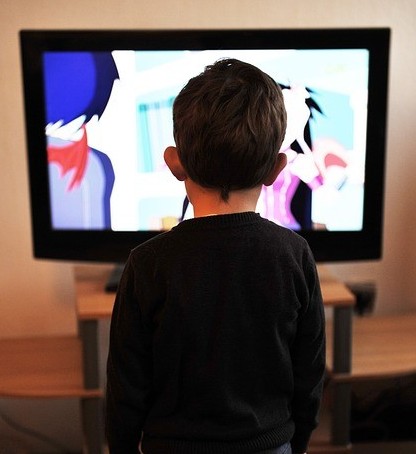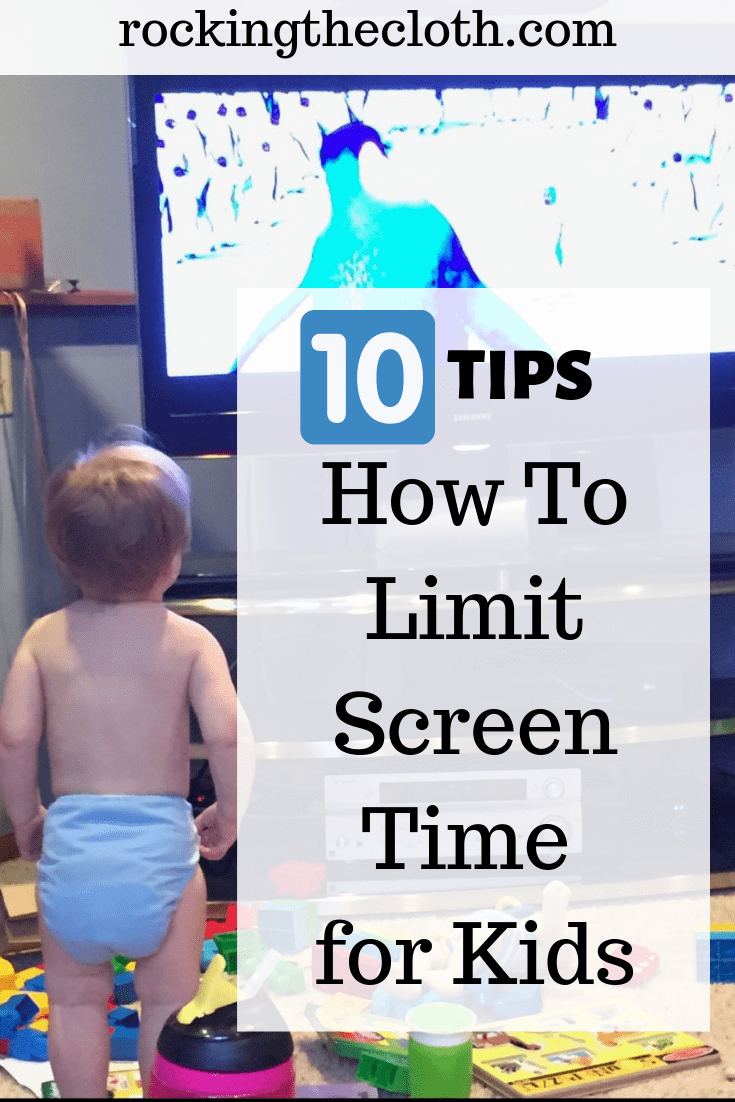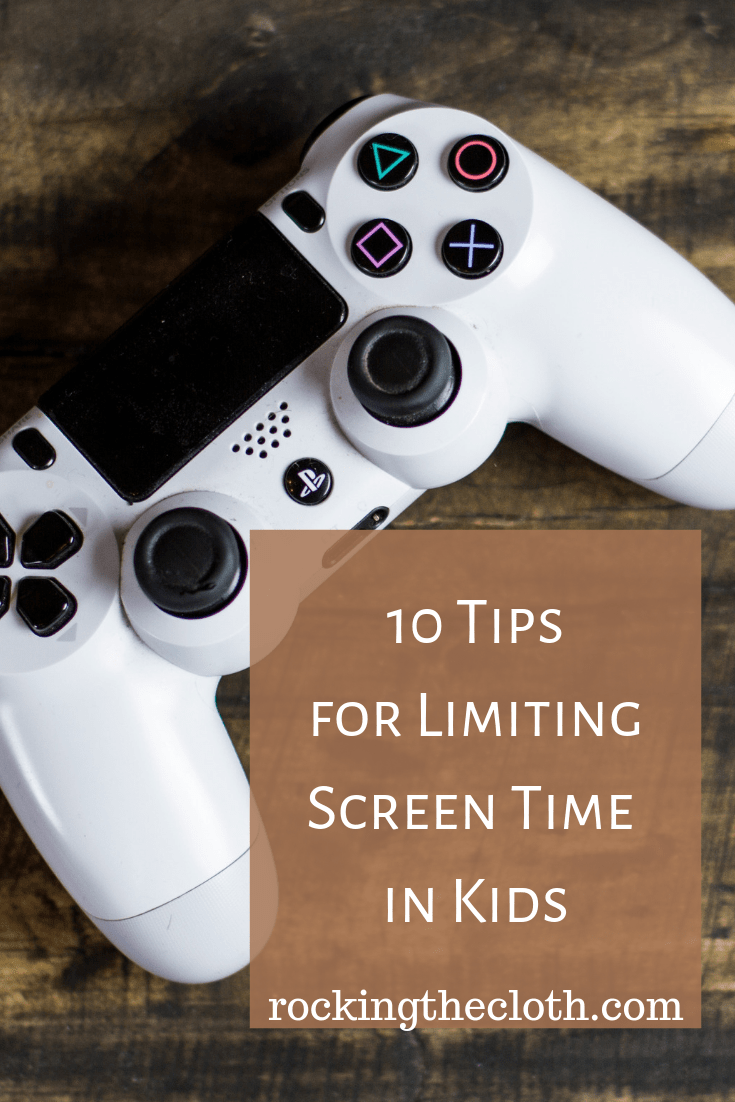My oldest son is turning 5 in two days–it feels like yesterday he was just learning to walk and getting into mischief for the first time–I can’t believe how time has flown. As they say, the days are long but the years are short. That’s never felt truer to me.
My oldest has asthma, and he really first started getting exposed to the iPad around 18-months old when we used it to distract him when he was getting nebulizer treatments. It was definitely a handy tool for that purpose. Soon enough, we also started showing him other kids shows like Mickey Mouse Clubhouse or Sesame Street on the TV or computer. Eventually, he started to get to watch these shows on our phones.
If you are like 99{9994046f29331ee04cc0b5e07eb28364315ea03ccc2f01b5a43e8b85b372d1e9} of parents, you have felt tempted to use screen time to your advantage at some point during your parenting journey, whether it be to try to administer medications as I described above, distracting your child when you had a phone call to make, buying yourself a few more minutes of sleep in the mornings, or trying to finish your meal in a restaurant.
Many parents start to wonder some things about screen time, such as if screen time is really that bad, or if their kids are getting too much, or if some types of screen time are better than others. For some, habits get formed and it becomes another source of “mom guilt.”
I want to share our story with screen time here to hopefully encourage other moms or dads out there, and also give you some practical steps to help reduce screen time in your home if that is a goal for your family.
Our Story
Like I mentioned above, my son first got to use the iPad around 18-months old to make administering nebulizer treatments easier. Of course, one thing led to another, and soon enough he was getting tablet time more than we realized he was, and definitely more often than we really wished he was.
Many of our struggles surrounding screen time with my oldest revolved around tantrums. Any time we had to turn it off, it would be a big problem. We tried timers, repeated warnings, etc. He had quite the temper (and still can sometimes!) It was always very dramatic, and obviously it became a problem because what parent wants to keep repeating things that lead to big tantrums?
Another issue we had that relates to the above was overstimulation and a decreased ability to regulate emotions. Of course, toddlers aren’t great at regulating emotions anyway. But we definitely noticed it was more dramatic when he had had screen time. He would be a little wired and have a hard time settling down. His temper would rage at the slightest things.
Eventually, we even had sleep problems. It was taking over two hours to get my son to sleep at night, and my husband and I grew very frustrated. It took us a while to connect the sleep problems to screen time usage (and I don’t remember how we finally made the connection), but once we did, it made a ton of sense and sleep improved immediately.
Now, all of this may make it sound like he must have been watching the tablet all day long. I can assure you that wasn’t the case. Both my husband and I worked full time and he attended daycare for about 9 hours a day. In those 9 hours, it is possible he had a show here and there, but screen time was definitely a luxury, not a regular pastime.
I usually allowed him to play on my iPad or watch a TV show as soon as we got home in the evenings. This gave me time to get dinner together and try to wind down a bit after a long day of work and commuting. At this point in time, the AAP recommended less than 2 hours of screen time (I believe it has been updated to 1 hour for that age group now) and we were pretty much within those guidelines given everything else we had to do in the evenings (dinner, bath, and an early bedtime).
However, we definitely noticed that even when we stayed within the recommended screen time limits, it still seemed to affect our son negatively.
What Should You Know About Screen Time?
There are many growing concerns with the use of screen time, especially excessive screen time, in children.
For one, screen time can affect kids’ eyes and vision. It can cause nearsightedness, eye fatigue, and dry eyes.
It also affects children’s circadian rhythm, therefore impacting sleep when used close to bedtime. The blue light on the screen can trick the brain into thinking it’s bright outside and is actually daytime. The content in the show or game can also wind a child up.
Children that have too much screen time are also more likely to have behavior problems, including exhibiting bullying behavior. They are more likely to be impulsive, moody, and be unfocused.
Screen time is incredibly addictive. I think about my own issues as an adult. I don’t think I’m as bad as some people, but I know I’ll often sit on the couch and mindlessly scroll through my phone as a way to kill time instead of being productive. Many of us probably feel like we are really busy, but we don’t realize how many minutes of our day we waste on our devices.
Children aren’t an exception to this. In some ways, they are much more prone to screen addiction than adults because they lack the ability to self-monitor and appropriately regulate their usage on their own. Even Silicon Valley executives are banning screen time in kids, going as far as sending them to tech-free charter schools, because they know firsthand just how addictive it can be.
As a teacher, I have students tell me all the time they were too busy to do their homework, but they weren’t too busy for Snapchat or Fortnite. 😉 This is completely anecdotal and based on my observations, but I’ve also noticed the past couple years that in some ways, kids are getting desensitized to average video content and are requiring more and more “fanciness” to be entertained.
Remember when we were in school and the teacher would pop in a video and none of us cared what it was, we were just glad to get a video? That’s not the case anymore. I put on a video now and I get lots of critiques, lots of “that is so boring”, and heaven forbid a kid just sit and watch–they want to be able to multitask with something they find more interesting, and get annoyed when I want them to put their full attention on the video I’m playing.
Is Screen Time All Bad?
It may sound like I am firmly against screen time and never let my kids have it anymore. That is not the case! The reality is that these devices are part of our lives now for better or for worse.
I’m just very much in the camp that it is our job as parents to put firm and clear parameters around screen time usage, and then STICK to it!
Kids can learn a lot of amazing things from shows and developmentally appropriate games. However, the AAP makes it clear that to reap these benefits, parents need to be watching the content with their child and talking about it with them. That is how kids will best internalize the messages we want them to get from the shows.
That may be bad news for some of us that like to use screen time for the occasional “babysitter” to help us get stuff done. (Guilty)
As with anything in life, it’s about balance. Being aware of screen time best practices is the first step, and then working to make improvements to your typical screen usage is the next step.
Screen Time Tips For Parents
We were able to get to a much better place with screen time for my family, and I’ll share the things we did here. Remember that I am just a mom, not a doctor or an expert in the field. This is just my opinion and I think it could help out a lot of other families. Take it or leave it. 🙂
1) Decide right now how much screen time you’re okay with.
You can find the AAP recommendations here or watch the video below:
When kids are younger than 18 months, the recommendation is none outside of video chats. Between 18 & 24 months, parents can choose to introduce high-quality children’s programming to their child in small doses and watch it with them to help them engage properly.
Between the ages of 2 and 5, the recommended limit is now 1 hour a day of high-quality programs, and parents are encouraged to watch the programs with their child.
What do you think will work for your family?
2) Make screen time a reward, not an automatic entitlement.
When your child misbehaves, how often do you threaten, “No more TV for the rest of the day!”? This implies that screen time was already a given, and it gets taken away for misbehavior.
One of the biggest things that made a difference for us is to change this “entitled” attitude around the TV. Make it something that your kids have to earn. TV time only happens when chores get done, meals get eaten, etc. You decide what is important to you and then stick to it.
3) Know what times of the day you are/aren’t okay with screen time.
We have a very firm stance that screen time before bed is a NO GO in this house. It is very obvious how it affects our son.
We also find that when we loosen up on this rule and allow him to watch an evening show or movie one day, he is RELENTLESS for many days or weeks afterward. Once he learned the rule could be broken, he never stopped trying to break it.
Stick to your guns!
I prefer to do screen time in the late morning because once lunch comes around, it is a natural, less argumentative time to stop the show. Then in the afternoon, my youngest naps, and my oldest needs to have playtime. I’m not saying he NEVER gets an afternoon show, but it has to be over by mid-afternoon so it doesn’t impact sleep, and he doesn’t get one if he hasn’t had some playtime first.
4) Know what your kids are watching, and make sure it’s worth it.
I can’t stress this enough. Know what your kids are watching. Even if you don’t think you’re going to discuss every episode with them like the AAP suggests you should, do sit and watch a couple of episodes to make sure it’s a show you’re okay with.
I never noticed at first how often Curious George disobeyed (in the name of curiosity) or some of the mean things characters can say to one another, even in shows that are supposed to be for young kids!
It’s not that I ban these shows (George is my son’s favorite!), but I try to make sure I’m in the room so I can discuss those things with my kids. (ex: Remember how the Man in the Yellow Hat told George not to do XYZ? But now he is and is in a lot of trouble? What do you think he should have done?)
These shows should also be worth it. Only you can decide what you think is worth it for your family. If you’re only supposed to have 1 hour a day, how do you want them spending it? Watching other kids playing video games on YouTube? Or do you think learning some social skills from Daniel Tiger is a better use of that time?
5) Get into a routine.
We have had the best luck controlling the whining that surrounds TV by having a firm routine that we stick to. My son knows not to even ask about TV at certain times of the day because we have other things we always do at that time.
6) Keep Busy
If you are struggling to reduce screen time and keep your sanity, get busy! Make it a point to get out of the house every day, even if it is only for a family walk around the neighborhood. Play outside with your kids. If the weather is bad, have some special indoor activities you like to do (I bought a cheap bounce house off Amazon I set up in the basement on rainy days and in the winter–it has been well worth the $180!)
Physical activity is really important for kids’ health and development. Heck, it’s good for all of us!
Another idea is instead of trying to do all your errands when you can leave the kids behind with your spouse, run your errands with your kids as daily activities to distract them from the desire to watch TV.
This might be some parent’s worst nightmare, but the more you take your kids shopping with you and practice good manners in stores (and practice saying no to endless requests to buy them things!) the easier it gets for all of you.
7) Consider the type of screen.
Do you notice that your child reacts to one type of screen time differently than others?
We did when it came to the iPad–the issues I described earlier in this post were almost always when he used the tablet. When he watched a DVD on the television, we had much fewer issues with anger and emotional regulation.
I don’t know if there is anything scientific to back that up–all I know is that this was our experience, and maybe it will help you, too.
8) Have a plan for handling personal devices.
At a young age, your child may not have their own device. However, with things like the Kindle Fire tablets, kids are getting their own devices younger and younger.
Have clear expectations for use and care of personal devices. Read up on the parental control options and decide what you may need to do to manage it.
Remember, it’s easier to start strict and loosen up later rather than the reverse (us teachers have a saying for this: “Mean until Halloween!” It means it’s better for us to start off the year rigid in our expectations and loosen up after they have been established and understood. It’s too difficult to try to tighten the reins after being too permissive).
Make sure you collect personal devices at night. Have a family charging station, or keep your child’s electronics in your bedroom. So many kids will sneak their phones, tablets, computers, or whatever it may be and stay up all night playing Minecraft or chatting with friends. I have had many sleep-deprived students because of late-night electronic use.
9) Use timers to help you stick to your guns.
When I let my son have a show but only want him watching for a short period, I tell him we are going to set a timer. I make him look me in the eyes when I go over the rules and time limit for the show. (I really need to do this, or my son has difficulty following through on his end of the agreement).
Make sure your timer is audible to your child. They need to hear it themselves. It kind of becomes an objective authority. 😉
Before I set the timer, I check the exact length of the show my son is watching and try to set it for that length as much as possible. We have much fewer issues when the end time aligns with the end of a show.
I mean, I know I don’t like stopping my show in the middle, either. It just makes sense to make sure your timer aligns with the show length. If your child is playing a game, this may not apply.
10) Model responsible electronic usage yourself.
It is hypocritical to be strict with our kid’s screen time, but then sit there scrolling through Facebook all day.
You might find that you are actually happier limiting screen time yourself! I know I feel much better about myself and my productivity when I make a conscious effort to spend less time on my phone and computer.
But one of the first Parenting 101 rules is to make sure you are modeling the behavior you want your kids to learn. This applies to screen time, too!
Being Smart About Screens
Screens are here to stay, and obviously, they aren’t all bad. But the negatives surrounding too much screen time are definitely worth acknowledging, and our kids only have one shot at childhood.
It’s all too tempting to say, “All I did was watch TV as a kid and I turned out fine!” But I really do think it’s different now. Kids don’t watch shows like we used to.
We used to have to watch our favorites at the time they were aired–there was no recording shows to watch whenever we wanted. We didn’t have the luxury of skipping around between shows on Netflix the second we found what we were watching the teeniest bit boring.
Nowadays, I believe this “on demand” culture negatively impacts things like attention span in our kids. It’s worth keeping an eye on!
Do you have any tips for reducing screen time in families? Share them in the comments!











This is the best article I’ve read in a really long time about screen time and devices for kids. It’s the first time I’ve ever read about blue light being bad for kids, and I’d like to add that blue light creates many issues and health concerns for kids’ health, not just issues with circadian rhythm and bedtime. It’s getting harder and harder all the time for parents to limit screen time with kids, but it’s also becoming more and more important!
Thanks Josie, and I agree! Screen time seems like no big deal when in the moment, but it’s definitely something parents need to be aware of for the good AND bad aspects, and make decisions and allowances with both the pros & cons in mind.
Thank you, Holly, for this wonderful article
I have three kids between the ages of 5 to 1, and the two older ones seem to have their lives revolve around their tablets.
I have heard and read a lot of all the negative impacts to much screen time can have on our little ones, and I just admit most of these are true, as I notice my little ones are becoming pretty addicted to their tablets and have reduced attention span
On several occasions, I tried to limit the times they spend on screens by setting out the time and trying to make it a routine but this never works for long, as sometimes when I get really busy and need no distractions, I allow them to use their tablets or watch the telly longer than necessary, and this happens often.
But after reading your article, I would try and implement your suggestions and see how it goes…
Thanks
Thanks for your comments. I agree, it isn’t easy! It involves a complete shift to your parenting habits and routines and a period of unpleasant whining and crying. But I do believe it’s worth it. Good luck!
This is a very nice and useful post. My 16-month-old baby is so attracted to youtube videos, it all begins because of our very busy schedules, always working and schooling, the little time we have free is to clean up the apartment and cook something healthy for all the family. She gets in kinda hypnotized whenever I put “doc mcstuffins” on and that’s good for me at that moment as long it gives me the peace I need to organize our day. I try not to keep her more than 2 hours a day, and whenever am less busy we watch it together and we usually sing along now that she can sing.
Sounds like you have found a routine that works for you!
Hi, Holly!
First off, I just want to say thank you for what you do. I don’t think teachers get all the credit and appreciation they really deserve. I was blessed with many great teachers, and for that, I’m appreciative.
This topic is very important and I think more parents should be more aware about the negative effects of screen time. This is in direct relation to a lot of ADHD cases.
I agree that screen time should be very limited, and it shouldn’t be used as a distraction. I always tell my nephews that technology is an awesome thing….if used correctly. Otherwise, it could prove to be highly destructive.
You’re a wonderful mother for being aware of these negative impacts. It’s unfortunate that not all are aware.
The links and sources you have attached are also great information. It backs up everything you talked about in your topic.
There is a TED talk of Simon Sinek in youtube entitled “Why Leaders Eat Last”. (Feel free to watch or not. :)). In the video, Simon Sinek talked about dopamine and the reward center, and how it could be dangerous if imbalanced.
At 8:00 is when he starts talking about it, and at 11:16 is when he starts to talk about the negative effects of dopamine. I enjoyed the lecture very much and I hope you will too if/when you find the time to watch it.
Again, thank you for an awesome read and for what you do and what you are. Keep teaching us kids and keep having faith that there are still a lot of good students that can be taught well.
Have a wonderful weekend!
-migzzz
Thank you so much! I’ll definitely check out that TED Talk–looks like a wealth of great info in there.